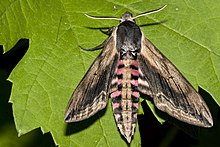Sphinx ligustri
| Privet hawk moth | |
|---|---|

| |
| Scientific classification | |
| Domain: | Eukaryota |
| Kingdom: | Animalia |
| Phylum: | Arthropoda |
| Class: | Insecta |
| Order: | Lepidoptera |
| Family: | Sphingidae |
| Genus: | Sphinx |
| Species: | S. ligustri
|
| Binomial name | |
| Sphinx ligustri | |
| Synonyms | |
| |
Sphinx ligustri, the privet hawk moth, is a moth found in most of the Palearctic realm. The species was first described by Carl Linnaeus in his 1758 10th edition of Systema Naturae.
Description
[edit]It has a 12 centimetres (4.7 in) wingspan (generally deflexed at rest), and is found in urban areas, forests and woodlands.
The male privet hawk moth can make a hissing sound, if disturbed, by rubbing together a set of scales and spines at the end of its abdomen.[2]
The larvae are usually found between July and August: and bury themselves in the earth when preparing to become a pupa. They then fly in the following June.[3]
Diet
[edit]As both its common name and specific name - ligustri being derived from the Latin ligustrum, 'privet' - describes, the caterpillars feed on privets, as well as ash trees, lilacs, jasmine, and a number of other plants.
Gallery
[edit]-
Female, dorsal side
-
Female, ventral side
-
Male, dorsal side
-
Male, ventral side
-
Caterpillar
-
Pupating
-
Pupa
-
Pupa, caterpillar, and adult
References
[edit]- ^ "CATE Creating a Taxonomic eScience - Sphingidae". Cate-sphingidae.org. Archived from the original on 2012-11-26. Retrieved 2011-11-01.
- ^ "Privet Hawk-moth – Natural Lizard". 2015-07-15. Retrieved 2024-05-24.
- ^ Donovan, Edward (1792). The Natural History of British Insects: Explaining Them in Their Several States, With the Periods of Their Transformations, Their Food, Economy, &c. Together With the History of Such Minute Insects As Require Investigation by the Microscope: The Whole Illustrated by Coloured Figures, Designed and Executed from Living Specimens. London. p. 79.
External links
[edit] Media related to Sphinx ligustri at Wikimedia Commons
Media related to Sphinx ligustri at Wikimedia Commons Data related to Sphinx ligustri at Wikispecies
Data related to Sphinx ligustri at Wikispecies- "69.006 BF1976 Privet Hawk-moth Sphinx ligustri Linnaeus, 1758". UKMoths. Retrieved December 13, 2018.
- Pittaway, A. R. (2018). "Sphinx Linnaeus, 1758". Sphingidae of the Western Palaearctic. Retrieved December 13, 2018.
- "06832 Sphinx ligustri Linnaeus, 1758 - Ligusterschwärmer". Lepiforum e.V. Retrieved December 13, 2018.








